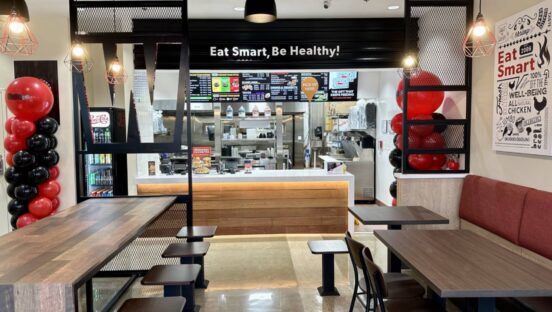Watch out Colonel Sanders—Starbird is airborne.
That’s “star” as in premium quality, and “bird” as in fried chicken. That’s right, the world of fried chicken—not always known for high-quality, healthier offerings—is about to take an unlikely twist into the emerging world of premium, fast-casual dining.
And this one has another twist, to boot: It’s developed by a team of R&D professionals at chef consultancy The Culinary Edge, the firm’s first proprietary concept.
Next month, Starbird plans to open its first location in the heart of Silicon Valley— Sunnyvale, California—with hopes of alluring free-spending but health-focused consumers. Two more California locations already are in the works.
The key question: Will Americans embrace premium fried chicken?
“Our goal is to fix everything that we believe is broken with fast food today,” says Aaron Noveshen, cofounder of Starbird and founder of The Culinary Edge. “There isn’t anyone doing chicken today with a super-premium product.”
Not even Chick fil-A, Noveshen adds. “We think Chick fil-A does a great job,” he says. “But our approach was conceived to improve upon theirs.”
Besides being free-range and antibiotic-free, Starbird’s chicken will also be local, hand-cut, hand-battered, and small batch–fried. Even the eggs dished at breakfast are organic and cage-free, served on rolls baked in-house. Then there’s the coffee, which is ground and brewed to order.
The premium quality may explain why breakfast checks will be slightly north of $6. Lunch is expected to weigh in at about $9, while dinner could fetch about $11.
In line with today’s rising crop of fast causals, Starbird has no drive thru. That’s because the chain’s three founders—Noveshen, Stephen Goldmann, and Steven Goldstein—all believe that drive thrus are yesterday’s news. Customers in a hurry are advised to open an app, place an order, and wait no more than five minutes in a specially marked parking area, where the food will be brought to their cars.
That’s food, by the way, that’s 100 percent chef-designed. Options include the $6.95 Free Range Ranch Sandwich, made with crispy chicken, tangy coleslaw, bacon, Pimento cheese, and Greek yogurt ranch dressing on a house-baked roll, and the $3.75 Maple Bacon Breakfast Taco, made with crispy chicken, egg, bacon, and maple sauce in a corn tortilla.
All of this is the result of years of experience in the limited-service world. The Culinary Edge ranks as one of the nation’s top restaurant consulting firms, working with roughly 25 percent of the nation’s top 200 chains, including Starbucks, Subway, Jack in the Box, and Popeyes. “We helped so many others that we realized it was time to bring our own brand to market,” Noveshen says.
The group opted to focus on fried chicken for the simplest of reasons: Consumers eat twice as much chicken as any other protein. “But there isn’t anyone else doing it today with a truly premium product,” Noveshen says. More than 100 different chicken versions were tested for Starbird before one won out, he adds.
Inside the restaurant, all of the cooking is done in an open area. “We want our guests to see where the bread is baked and where the food is cooked,” Noveshen says.
Even the oil the chicken is fried in is unconventional. Instead of canola oil, Starbird uses oil made from rice bran. It also offers grilled chicken—as well as tofu—for those who prefer healthier options.
For Noveshen, who is also the cofounder of Pacific Catch restaurants, there was little doubt since his early childhood that cooking would be a major part of his life. “I didn’t like the way my sister made mac ’n’ cheese, so it inspired me to get out in front and do it myself,” he says.
A second Starbird location already is in the design stage in Foster City, California, and a third Silicon Valley location also has been selected. If these three succeed, look for more in the San Francisco Bay Area—and in other markets, too, Noveshen says.
At least one industry consultant thinks the concept could be a hit. Starbird could appeal to the Chipotle crowd that’s always on the prowl for new, better-quality food, says Janet Lowder, president of Restaurant Management Services in Rancho Palos Verdes, California. She suggests that some all-day breakfast offerings at Starbird could pull in more Millennials.
In the end, Noveshen says, there’s really no secret sauce to success. “The way to build a great restaurant company is to start with one really amazing one,” he says.





